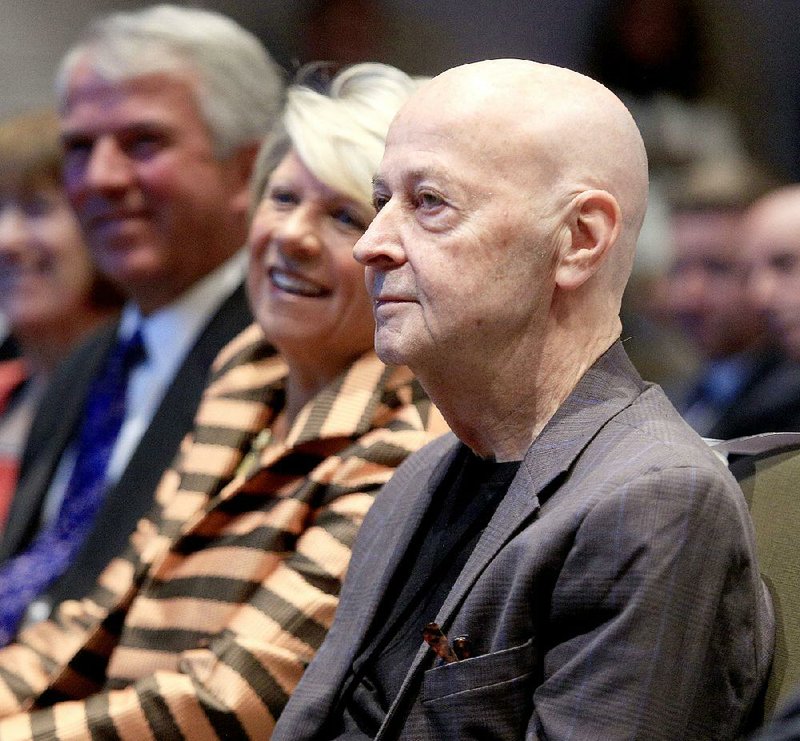Stuart Cobb received two tokens after her final treatment for a form of multiple myeloma.
Cancer patients at the University of Arkansas for Medical Sciences receive the tokens after their last treatment. Traditionally, one token goes into The Seed of Hope, a sculpture celebrating survival at the academic medical center's Winthrop P. Rockefeller Cancer Institute. Patients can keep the second token or pass it along as a symbol of hope.
On Monday, Cobb -- who had been diagnosed with the blood cancer that mostly affects men -- passed along her second token to Bob Hugin, chairman and chief executive officer of Celgene Corp., a N.J.-based bio-pharmaceutical company.
Just minutes before, Hugin announced two grants totaling $10 million for the world-renowned UAMS Myeloma Institute. The money will help create the Bart Barlogie Center for Molecular Diagnostics and establish the Celgene Distinguished Endowed Chair in Molecular Therapeutics.
"When I was diagnosed just over seven years ago with a form of multiple myeloma, the word 'cure' was never mentioned," Cobb said. Myeloma is a blood cancer that develops in bone marrow.
"People were talking about five years, maybe 10 years, and that was really, really exciting. A cure would be really, really great, Dr. Barlogie."
Barlogie founded the Myeloma Institute at UAMS in 1989, but stepped down nearly a year ago to continue research and to care for patients. Dr. Gareth Morgan became Barlogie's successor as the director of the Myeloma Institute.
Since its inception, the institute has cared for more than 11,000 patients from across the country and even some from abroad, UAMS Chancellor Dr. Dan Rahn said.
The institute has logged many firsts, including becoming the first cancer center to conduct outpatient bone-marrow transplants, the first to use gene-expression profiling to classify patient risks and the first to receive a project grant from the National Cancer Institute, he said.
The pharmaceutical company made the donation for three reasons.
The first, Hugin said, was to recognize the accomplishments and "outstanding work" at UAMS and the "outstanding commitment for quality patient care and outcomes."
The second was in the spirit of cooperation.
"There is no doubt in the world, today we are at an incredibly unprecedented time of great promise in the world of molecular biology and information technology. We're incredibly optimistic that the next decade will be the real era of the benefit of the molecular revolution, combined with information technology," Hugin said. "But we're also in some really challenging economic times."
Governments, along with the private sector, are having fiscal problems. But collaboration brings promise, he said.
"Integrative, collaborative solutions must be part of the solution," he added. "And if we're going to turn this incredibly scientific and medical promise into reality for patients [to] have the kind of breakthrough therapies they deserve and so dramatically need, we must work together. And we want to walk the walk, not just talk the talk."
The last reason for the gift, Hugin said, was gratitude.
Barlogie and his team looked at using thalidomide, a drug now used to treat myeloma, when others wouldn't, he said. The drug had been linked to birth defects.
But it's "a story of bad turned good," Morgan said.
The thalidomide trial wasn't designed to get approval from the U.S. Food and Drug Administration, Barlogie said. The second patient in the trial had no blood platelets and was transfusion-dependent, Barlogie said. That trial patient came back weeks later with "numbers unseen," he said.
"I think it actually proved that when something works, it really almost doesn't matter how it's done," Barlogie said.
Just before the grant announcement, Barlogie said a patient with multiple myeloma had died.
"We've just got to remember what got us here and remember to want to serve," he said. "It's all about serving."
The gifts will help continuity -- linking the past with the future, Morgan said.
"We've explored most of the avenues that are open for us," he said. "And so we need a subtly different direction. And that direction, I think, is about precision medicine."
Precision medicine -- or personalized medicine -- allows medical providers to provide drugs or treatments targeted for a patient's DNA. That type of treatment could allow for the best patient outcomes with minimal side effects, Morgan said.
"The strategic relationship between a pharmaceutical company and an academic institution is absolutely the right way forward, and it's the only way forward," he said. "And we're going to put Arkansas -- and UAMS -- right at the cutting edge of these processes."
For patient Denis McDonald, 70, UAMS has been at the forefront for years. The New Orleans resident was diagnosed with the cancer nearly two decades ago.
"I went on the Internet, which was not that developed in 1995, and kept reading the name 'Barlogie' in the research papers," he said.
Within six days of his diagnosis, he was in Little Rock seeking treatment.
"It was a godsend," he said.
McDonald had a stem-cell transplant using his own cells, which he said bought him time as the drugs to treat myeloma were steadily developing. He was in remission but relapsed after 12 years, he said.
On the second go-around, McDonald began taking a form of thalidomide for 18 months before he went into remission again. Now, he comes to Little Rock every four to six weeks for a diagnostic follow-up.
Come April, the retired textile converter will have his 50th bone-marrow biopsy.
McDonald said he was "overwhelmed" with the grants as a gift for future patients.
Researchers have made great strides so far, Hugin said.
"But let's be clear," he said. "We are not where we want to be. We are not where we need to be. And we very much hope that in working together, we'll come back here and talk about the cure for myeloma."
Metro on 03/03/2015

